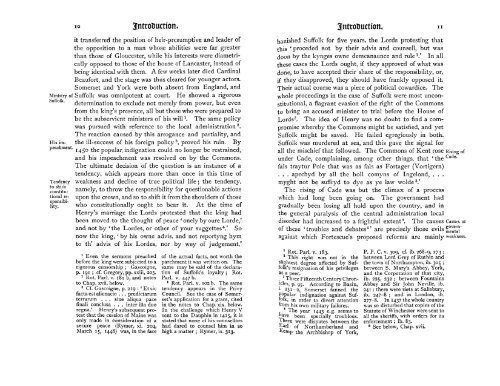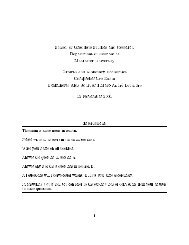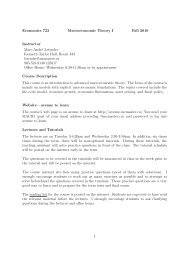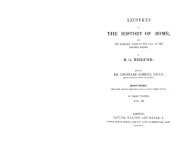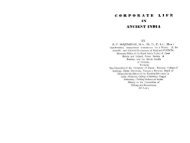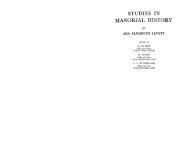it tr<strong>an</strong>sferred the position of heir-presumptive <strong>an</strong>d leader ofthe opposition to a m<strong>an</strong> whose abilities were far greaterth<strong>an</strong> those of Gloucester, while his interests were diametricallyopposed to those of the house of L<strong>an</strong>caster, instead ofbeing identical with them. A few weeks later died CardinalBeaufort, <strong>an</strong>d the stage was thus cleared for younger actors.Somerset <strong>an</strong>d York were both absent from Engl<strong>an</strong>d, <strong>an</strong>dMinistry of Suffolk was omnipotent at court. He showed a rigorousdetermination to exclude not merely from power, but evenfrom the king's presence, all but those who were prepared tobe the subservient ministers of his will l. <strong>The</strong> same policywas pursued with reference to the local administrationz.<strong>The</strong> reaction caused by this arrog<strong>an</strong>ce <strong>an</strong>d partiality, <strong>an</strong>dHis im- the ill-success of his foreign policy 3, proved his ruin. Bypeachment.1450 the popular. indignation could no longer be restrained,<strong>an</strong>d his impeachment was resolved on by the Commons.<strong>The</strong> ultimate decision of the question is <strong>an</strong> inst<strong>an</strong>ce of atendency, which appears more th<strong>an</strong> once in this time ofTendency weakness <strong>an</strong>d decline of true political life; the tendency,to shi~kconstito- namely, to throw the responsibility for questionable actionstional re- upon the crown, <strong>an</strong>d so to shift it from the shoulders of thosesponsibi-Iity. who constitutionally ought to bear it. At the time ofHenry's marriage the Lords protested that the king hadbeen moved to the thought of peace ' onely by oure Lorde,'<strong>an</strong>d not by 'the Lordes, or other of your suggettes4.' Sonow the king, 'by his owue advis, <strong>an</strong>d not reportyng hymto thy advis of his Lordes, nor by wey of judgement,'' Even the sermons preachedbefore the king were subjected to arigorous censorship ; Gascoigne,p. 191 ; cf. Gregory, pp. xxiii, 203.Rot. Parl. v. 181 b, <strong>an</strong>d notesto Chap. xvii, below.SCf. Gascoigne, p. 219 : ' Et sicfacta est alienacio ... predictarumterrarum . . . sine aliqua pacefinali conclusa . .. inter illa duoregna.' Henry's subsequent protestthat the cession of Maine wasonly made in consideration of asecure peace (Rymer, xi. 204,March IS, 1448) was, in the faceof the actual facts, not worth theparchment it was written on. <strong>The</strong>same may be said of the declarationof Suffolk's loyalty ; Rot.Parl. v. 447 b.* Rot. Parl. v. 102 b. <strong>The</strong> sametendency appears in the PrivyCouncil. See the case of Somerset'sapplication for a gr<strong>an</strong>t, citedin the notes to Chap. xix. below.In the challenge which Henry Vsent to the Dauphin in 1415, it isstated that none of his counsellorshad dared to counsel him in sohigh a matter ; Rymer, ix. 313.b<strong>an</strong>ished Suffolk for five years, the Lords protesting thatthis ' proceded not by their advis <strong>an</strong>d counsell, but wasdoon by the kynges. - owne deme<strong>an</strong>aunce <strong>an</strong>d rule l.' In allthese cases the Lords ought, if they approved of what wasdone, to have accepted their share of the responsibility, or,if they disapproved, they should have fr<strong>an</strong>kly opposed it.<strong>The</strong>ir actual course was a piece of political cowardice. <strong>The</strong>whole proceedings in the case of Suffolk were most uncon-&utional, a flagr<strong>an</strong>t evasion of the right of the Commonsto bring <strong>an</strong> accused minister to trial before the House ofLords" <strong>The</strong> idea of Henry was no doubt to find a compromisewhereby the Commons might be satisfied, <strong>an</strong>d yetSuffolk might be saved. He failed egregiously in both.Suffolk was murdered at sea, <strong>an</strong>d this gave the signal forall the mischief that followed. <strong>The</strong> Commons of Kent rose Rising orunder Cade, complaining, among other things, that ' the Cade.fals traytur Pole that was as fals as Fortager (Vortigern). . . apechyd by all the h011 comyns of Ingelond, . . .myght not be suffryd to dye as ye law wolde3.'<strong>The</strong> rising of Cade was but the climax of a processwhich had long been going on. <strong>The</strong> government hadgradually been losing all hold upon the country, <strong>an</strong>d inthe general paralysis of the central administration localdisorder had increased to a frightful extent4. <strong>The</strong> causes Causes otgovel n-of these 'troubles <strong>an</strong>d debates5' are precisely those evilsagainst which Fortescue's proposed reforms are mainly weakness.Rot. Parl. v. 183.This right was not in theslightest degree affected by Suffolk'sresignation of his privilegesas a peer.S Three Fifteenth Century Chronicles,p. 95. According to Basin,i. 25 I - 2, Somerset f<strong>an</strong>ned thePopular indignation against Suffolk,in order to divert attentionfroin his own military failures.<strong>The</strong> year 1443 e.g. seems tohave been specially troublous.rhere were disputes <strong>between</strong> theEarl of Northumberl<strong>an</strong>d <strong>an</strong>dKemp the Archbishop of York,P. P. C. v. 309, cf. ib. 268-9, 273 ;<strong>between</strong> Lord Grey of Ruthin <strong>an</strong>dthe town of Northampton, ib. 305 ;<strong>between</strong> S. Mary's Abbey, York,<strong>an</strong>d the Corporation of that city,ib. 225, 232 ; <strong>between</strong> FountainsAbbey <strong>an</strong>d Sir John Neville, ib.241 : there were rists at Salisbury,ib. 247-8 ; <strong>an</strong>d in London, ib.277-8. In 1437 the whole countrywas so disturbed that copies of theStatute of Winchester were sent toall the sheriffs, with orders for itsenforcement ; ib. 83.See below, Chap. xvii.
directed, <strong>an</strong>d they must therefore be investigated somewhatin detail.Poveit~. One great cause of the weakness of the government wasno doubt its poverty. <strong>The</strong> revenue both central <strong>an</strong>d local1was hopelessly encumbered, largely by gr<strong>an</strong>ts of <strong>an</strong>nuities<strong>an</strong>d pensions to persons who were in reality much richerth<strong>an</strong> the crown2. <strong>The</strong> notes to this work will show indetail how every br<strong>an</strong>ch of the public service was const<strong>an</strong>tlyin arrear3. It was seldom if ever possible to waituntil the supplies gr<strong>an</strong>ted by Parliament were actuallyI,o<strong>an</strong>s. collected. Parliament itself generally gave authority tothe Council to raise lo<strong>an</strong>s on the security of the taxes.Where this parliamentary s<strong>an</strong>ction was given, <strong>an</strong>d thelo<strong>an</strong>s were punctually repaid, this system was perhapsconstitutionally unobjectionable 4. But the fin<strong>an</strong>cial resultwas disastrous. Fortescue estimates the loss to the kingat ' the fourth or fifth penny of his revenues ".' Lo<strong>an</strong>s wereconst<strong>an</strong>tly asked for from individuals, corporations, <strong>an</strong>dtowns, <strong>an</strong>d sometimes in a way which seems distinctlyunconstitutional^ Beaufort was the chief lender <strong>an</strong>d lo<strong>an</strong>On the state of the local revenue,see notes to Chap. xv.below.See notes to Chap. vi. below,<strong>an</strong>d cf. Gascoigne, p. 158.S See especially notes to Chaps.vi, <strong>an</strong>d vii.A list of towns <strong>an</strong>d persons,with the sums which they wereexpected to lend under Parliamentaryauthority,is in P.P. C. iv. 316K(1436). <strong>The</strong>re are innumerableentries in the Cal. Rot. Pat. 'delnutuo faciendo per totum regnum;' 273 a, 274 b, 275 b, 276 b,280 b, 284 b, 289 b, 293 b, 295 a,296 a. U7hether all these had parliamentaryauthority I c<strong>an</strong>not say.<strong>The</strong> Lords of the Council <strong>an</strong>dothers had frequently to bindthemselves not to allow the assignmentsmade for repayment oflo<strong>an</strong>s to be tampered whh ; P.P. C.iv. 145 ; Rot. Parl. iv. 275 b. Thisprecaution had been taken underHenry V ; ib. 117.That itwas not unnecessary is shown bythe fact that in 1442 Beaufortalone supported the Treasurer inresisting <strong>an</strong> attempt to assign revenuethat had been already appropriated; P. P. C.V. 216, cf. 220.But in 1443 he agreed to a gr<strong>an</strong>tout of the customs of London,' notwithst<strong>an</strong>dyng <strong>an</strong>y assignementmaade before, <strong>an</strong>d notwithst<strong>an</strong>dyng<strong>an</strong>y estatut act or orden<strong>an</strong>ce; ' ib. 227.Chap. v. below.In 1430 the Pope lent Henrymoney ; 1'. P. C. iv. 343. In 1437a special appeal was made to theclergy; ib. v. 42. Dr. Stubbs(C. H. iii. 276 note) has tried tom~n~rni~e the charge of unconstitutionaltaxation brought againstthe L<strong>an</strong>castri<strong>an</strong> kings. One document,he thinks, is wrongly assignedto that period. Other cases' ~nvolke only the sort of lo<strong>an</strong>scol~tractor to the government '. <strong>The</strong> king's jewels werein pawn '. And the government seem not tohave been above such petty acts of tyr<strong>an</strong>ny as exactingthe fines for respite of knighthood twice over 3. Fortescue Exquisitellimself admits that the poverty of the king compels him me<strong>an</strong>s.g to fynde exquysite me<strong>an</strong>es of geyting of good 4.' It ishardly likely that in this he is thinking oidy of the reignof ~dward IV. It is obvious that <strong>an</strong> administration thusstarved could not be efficient. <strong>The</strong> remedies which Fortes~ue'bFortescue proposes for this state of things are a largereme'"e"increase in the perm<strong>an</strong>ent endowment of the crown, <strong>an</strong>dthe making of that 'livelod ' inalienable, a resumption ofgr<strong>an</strong>ts, the limitation of the king's power of giving bymaking the consent of the council necessary, <strong>an</strong>d a systemwhich were s<strong>an</strong>ctioned by Parliament,'though, if they were notactually s<strong>an</strong>ctioned by Parliament,their constitutional characterwould still be doubtful. But thefollowing inst<strong>an</strong>ce (which Dr.Stubbs does not cite) seems tooclear to be explained away.RIGHT trusty, &c.Howe it bethat . . . . we . . . . charged youeither to have sende . . . . the cc.marE, like as ye aggreed . . . . tolenne us, . . . .or elles to have apperedpersonally before us <strong>an</strong>doure Counsaille ; . . . . Neverthelesse. . . . ye neyther have sendethe saide money, nor appered . . . .For so moche we write.. . . straitelycharging you, that as ye woleschewe to be noted <strong>an</strong>d taken fora letter <strong>an</strong>d breker of tharmee,whiche is appointed to be sendeunto our saide duchie (of Guye?ne),. . . . ye withoute delay. . . .either sende by the berer heroffhe saide cc. mar?, . . . .or commeIn alle possible haste personellyoure saide Counsaille, . . . .uPoii the paine abovesaide.' (July,'453,) P. P. C. vi. 143, cf. ib. 330.To require a person to sendmoney by the bearer, or to appearbefore the Council under pain ofbeing 'noted' as a disloyal sub-ject, is surely as arbitrary a proceedingas c<strong>an</strong> well be imagined.That the m<strong>an</strong> had promised tolend the money does not affect theconstitutional question, if the promisewas one which the govern-ment had no right to exact. EdwardIV's fin<strong>an</strong>cial measures wereperhaps only a reduction to systemof the hints furnished by his predecessors.' For Beaufort's lo<strong>an</strong>s, seeP. P. C. iv. <strong>an</strong>d v. passim.'e.g. P. P. C.iv.214, vi.106,&c. Cf. notes to Chap. vii.At least a petition of the Commonsthat this might not be donewas refused in 1439 ; Rot. Parl. v.26 b.Chap. v. below. Accordingto De Coussy, c. 42, ed. Buchon,p. 83 b, the poverty of theroyal household was sometimes soextreme, that the king <strong>an</strong>d queenwere in positive w<strong>an</strong>t of a dinner.On one occasion the Treasurerhad to redeem a robe which theking had given to St. Alb<strong>an</strong>'s,because it was the only decent onewhich he possessed ; Whetham-stede, i. 323. That this povertywas one great cause of the unpopularityof the government ofHenry VI, see Eng. Chron., p. 79.
- Page 1 and 2: OTHER WISE CALLEDThe Difference bet
- Page 3 and 4: THE work here presented to the read
- Page 5 and 6: preface. preface, xihistorical bear
- Page 7 and 8: NOTE.-AS a general rule the authori
- Page 9 and 10: xviii CLbconological Cable, QLbrono
- Page 11 and 12: INTRODUCTION.PART I.TIIE fifteenth
- Page 13 and 14: Key-note ' The key-note of the Lanc
- Page 15: 3(n troduction,His reign only as de
- Page 19 and 20: crimes from punishment'. This evil,
- Page 21 and 22: Perversionof justice.Localoffice1 S
- Page 23 and 24: Influence use their local power to
- Page 25 and 26: houses of Parliament an oath agains
- Page 27 and 28: Tumber of action lay1. One cause of
- Page 29 and 30: The House been judged in history fo
- Page 31 and 32: does not involve the acquittal of t
- Page 33 and 34: life as ahnrrister.become possessed
- Page 35 and 36: ford Castle a prisoner named Thomas
- Page 37 and 38: Anarbitra- Wentworth and Sir John F
- Page 39 and 40: The Lancastriansretirenorthwards.Ag
- Page 41 and 42: which they said was ruining the cou
- Page 43 and 44: Illterview way alone. At Bdthune th
- Page 45 and 46: feelings the exiles received the ne
- Page 47 and 48: Requiredto write infavour ofthe Yor
- Page 49 and 50: Other come down to us for the most
- Page 51 and 52: And moche good truly gotyn hath bee
- Page 53 and 54: Date.The DeI.arrcfi6usLegurnA uglii
- Page 55 and 56: The RIS. is well and correctly writ
- Page 57 and 58: cording to Mr. Thompson, is of the
- Page 59 and 60: I'robably On the whole, the second
- Page 61 and 62: Aquinas, six I have failed to trace
- Page 63: Fortescue'scontemporaries.Littleton
- Page 66 and 67:
sithpn thai had a kynge, wich was G
- Page 68 and 69:
that cause and for gret necessite w
- Page 70 and 71:
such meane. And yet of necessite th
- Page 72 and 73:
and sqviers, and oper, in also gret
- Page 74 and 75:
or by lande, pe kyng most encomptre
- Page 76 and 77:
grettest lordes off Englond, rose a
- Page 78 and 79:
as hynl liste. And by discente per
- Page 80 and 81:
haue wherwith to bie hem bowes, arr
- Page 82 and 83:
Ther is no man hanged in Scotlande
- Page 84 and 85:
e kyng be counsellyd to restrayne g
- Page 86 and 87:
pe Romans, but also is hyghnes shal
- Page 88 and 89:
muned and del~bered with his fforsa
- Page 90 and 91:
CRITICAL NOTES.CHAPTER I.P. 109. 1.
- Page 92 and 93:
Bfbe bobernance of QEnfiian'tr,CHAP
- Page 94 and 95:
1. 24. parcial] parcialite L (from
- Page 96 and 97:
for granting taxes was the same as
- Page 98 and 99:
moral philosophy, but consists of a
- Page 100 and 101:
are brought about by the sin of man
- Page 102 and 103:
note$+ QLbap. ii,regendo: non autem
- Page 104 and 105:
note$+ CCbap, ii,up in the most une
- Page 106 and 107:
Later statutes fixed the limit of l
- Page 108 and 109:
&be bobernanre of QEngIanD*applied
- Page 110 and 111:
of the household of George Duke of
- Page 112 and 113:
RgidiusRumanus.. . . homines sibi s
- Page 114 and 115:
note see Janet, i. 35 1-373, 396,42
- Page 116 and 117:
'Ordinaryand extraordinaryexpenditu
- Page 118 and 119:
p----p---3723ESTIMATED EXPENDITURE.
- Page 120 and 121:
pestifera.' Very possibly Fortescue
- Page 122 and 123:
i the clerkys off theschekquer.] Be
- Page 124 and 125:
eciting how 'the seid Duc . . . lat
- Page 126 and 127:
was defined by Parliament in 4 Edwa
- Page 128 and 129:
punish ' piratas et spoliatores mer
- Page 130 and 131:
marchandyse is lost, . . . the see
- Page 132 and 133:
Transition pensiononmg, as it was d
- Page 135 and 136:
@Lbap+ bii,commiscomissioners in gr
- Page 137 and 138:
ap1-0,Bterc,cjzt4IjAnd on the other
- Page 139 and 140:
Charleshlartel.Fall of theCarolingi
- Page 141 and 142:
the Abbey of S. Albons' (July: Past
- Page 143 and 144:
York, married Constance and Isabell
- Page 145 and 146:
Taxon France, ii. 526, 533-4, 547,
- Page 147 and 148:
499 b). And no less than ~o,ooo mar
- Page 149 and 150:
which was probably in Fortescue's m
- Page 151 and 152:
holders of such grants are however
- Page 153 and 154:
286 Cbe Booernance of Qngianb.exter
- Page 155 and 156:
teristic of the Lancastrian times,
- Page 157 and 158:
such a contenuall counsell.] ' The
- Page 159 and 160:
character which the council might p
- Page 161 and 162:
which can not counsele hym' (Append
- Page 163 and 164:
306 &be bobernance of QEnglanD.'whe
- Page 165 and 166:
Sicque horum mediis concessit tande
- Page 167 and 168:
Ebe bobernance of QEngland.qualific
- Page 169 and 170:
Controlof the exchanges.Jealousyof
- Page 171 and 172:
during good behaviour. The Master o
- Page 173 and 174:
Cbe Qiobernance of QEngIand,says: '
- Page 175 and 176:
should be Justice, Chamberlain, Cha
- Page 177 and 178:
Offices per- system of executing of
- Page 179 and 180:
Defined by (e.g. Rot. Parl. v. 2 73
- Page 181 and 182:
have been detailed in the notes to
- Page 183 and 184:
of Sir Harris Nicolas there). This
- Page 185 and 186:
iiij. lordis temporelx, or in lasse
- Page 187 and 188:
y a pretensed title, saying he ys d
- Page 189 and 190:
'every broker, brogger, andhuckster
- Page 191 and 192:
suffre, suffer, 152. 14 ; soeffre,
- Page 193 and 194:
Cade, rising of, pp. 11, 284; hisco
- Page 195 and 196:
~ .-.~--hopes entertained of him, p
- Page 197 and 198:
Franchise, question of, in medizval
- Page 199 and 200:
Loans raised by the government,pp.
- Page 201:
Pisa, Council of, p. 243. .Pitt, se


